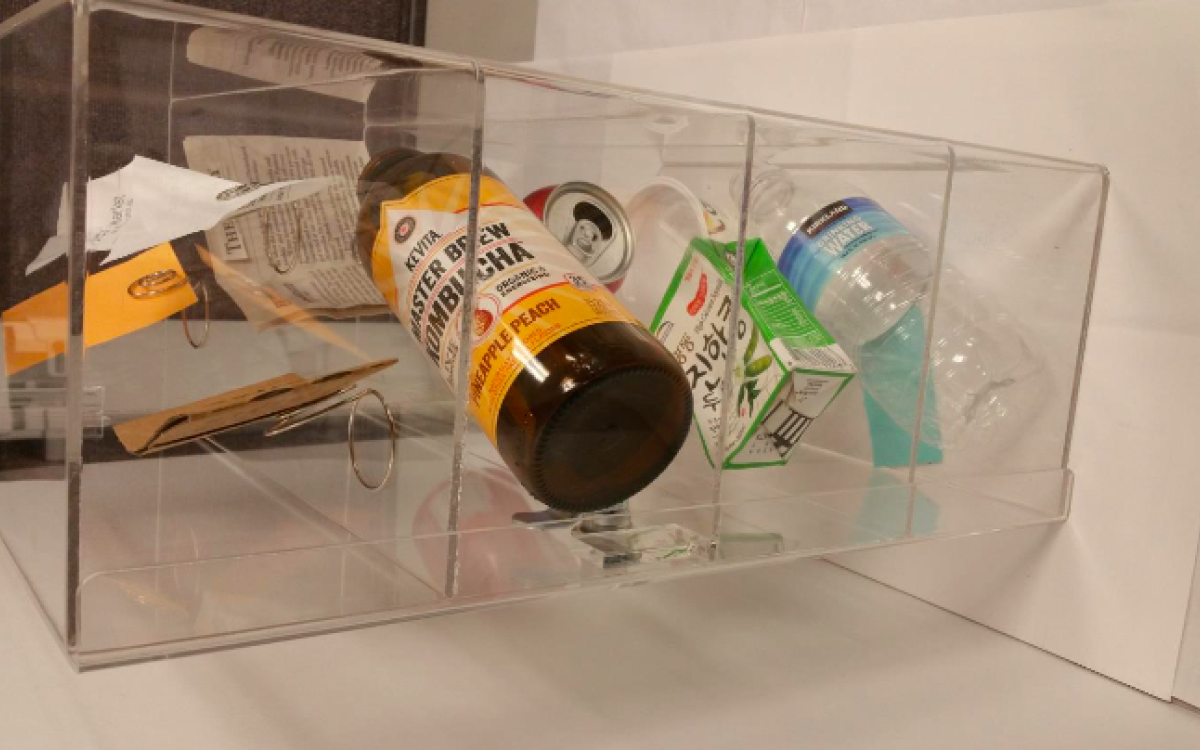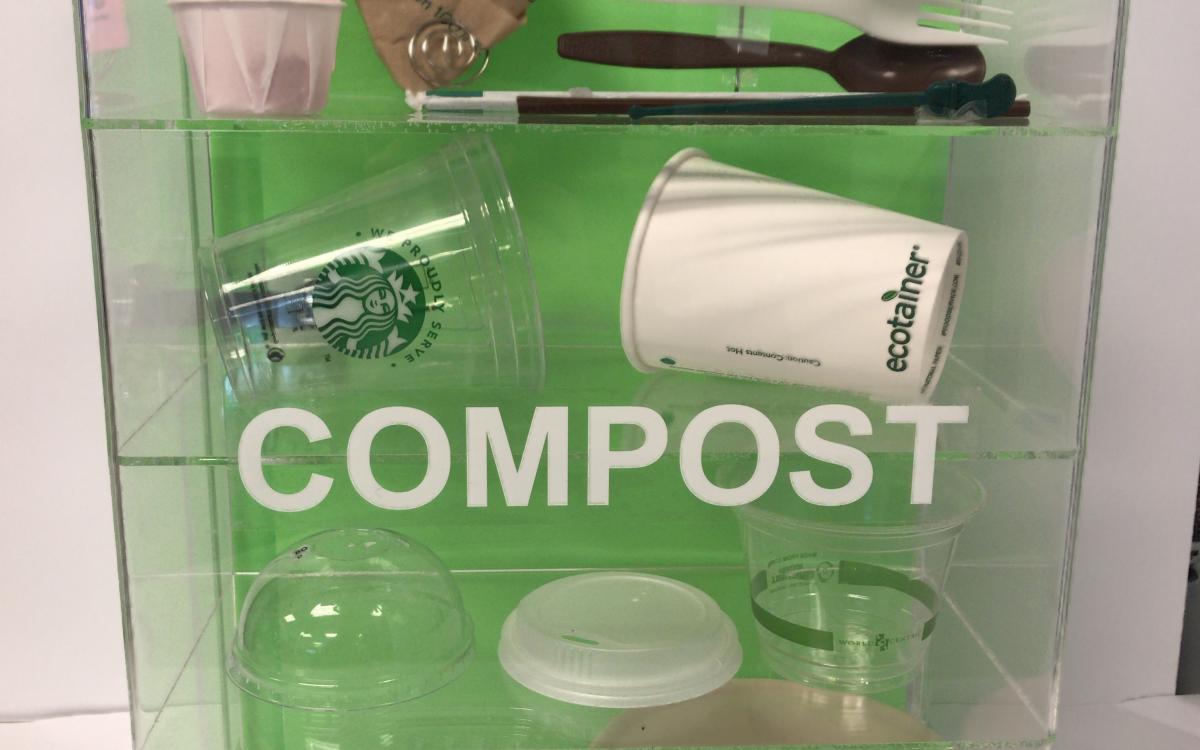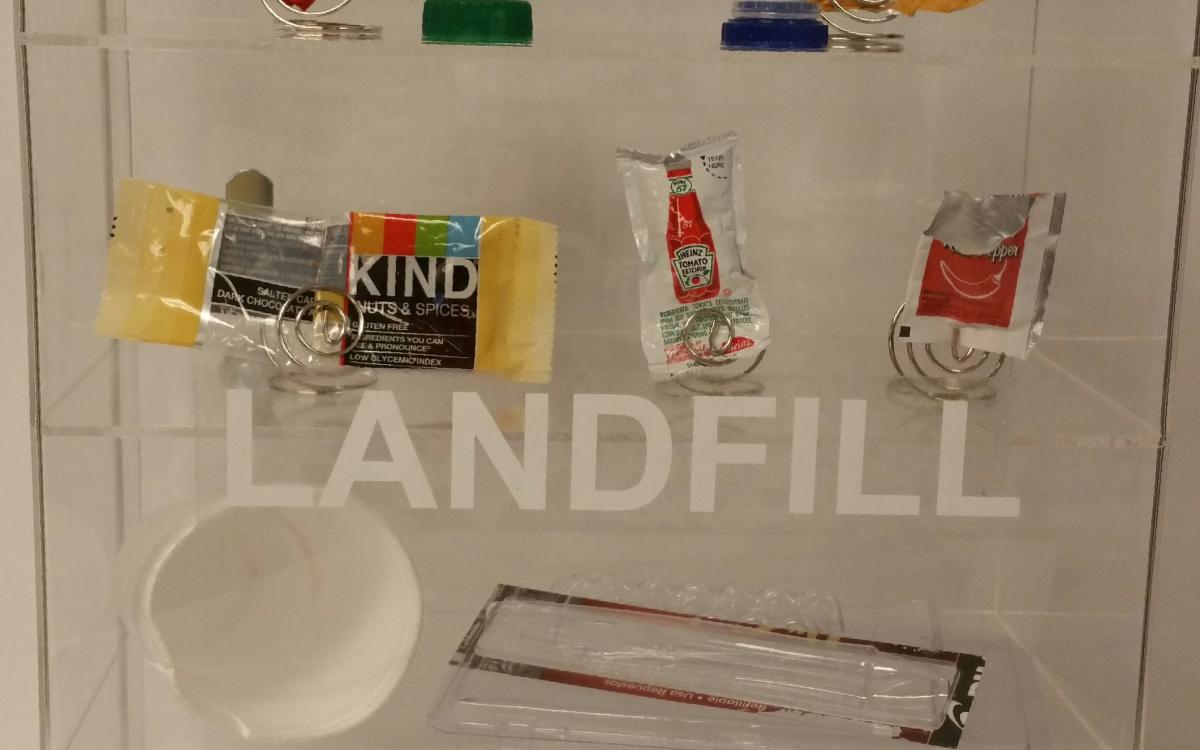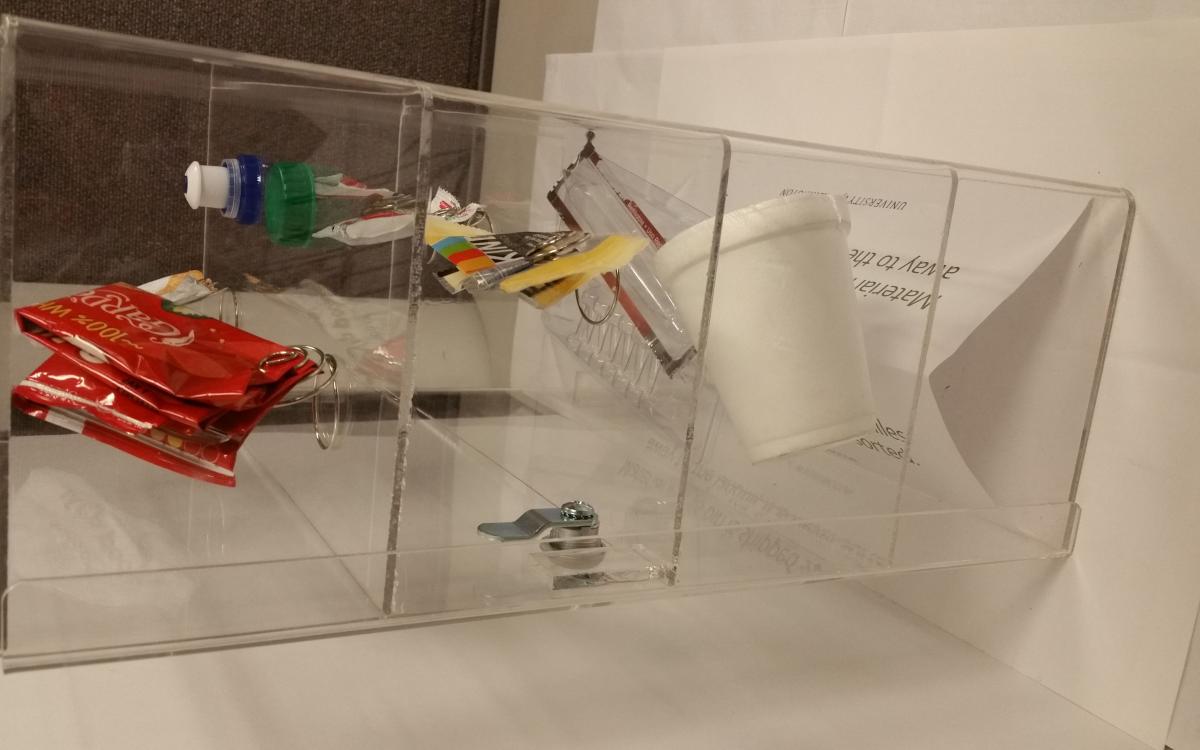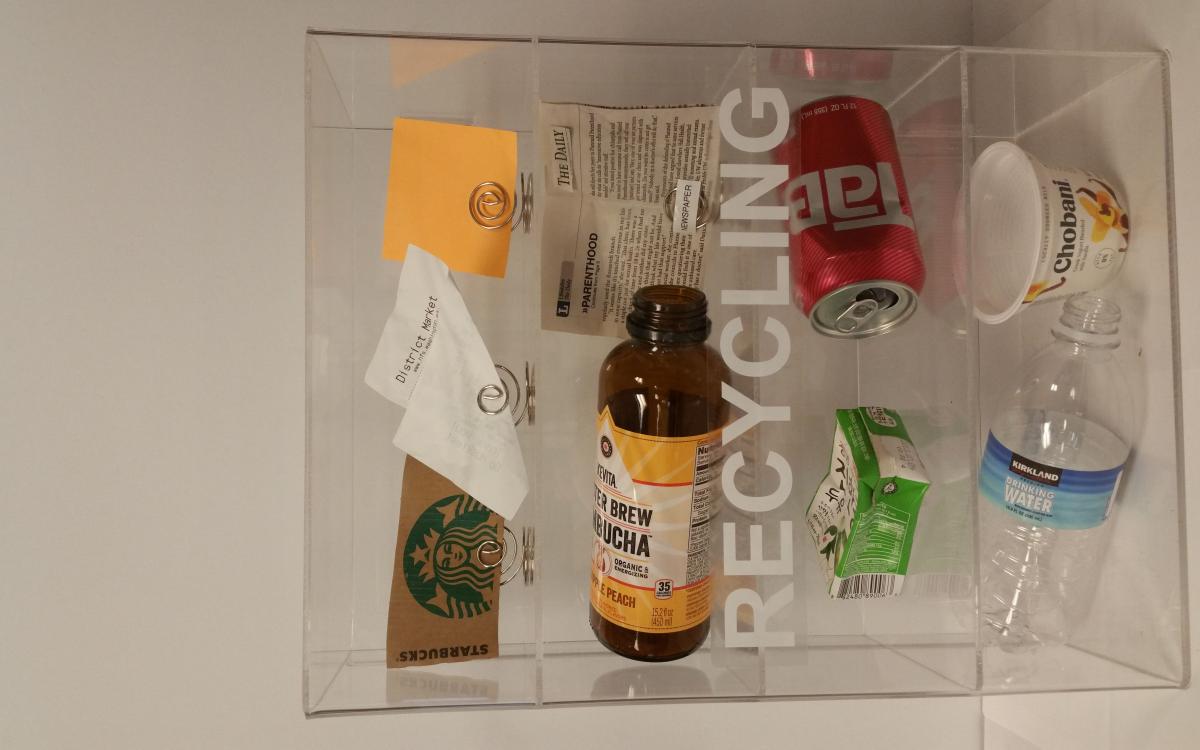At a glance
EcoReps' new 3D bins displays with physical items instructing people how to sort their trash, recycling, and compost – in… Read full summary
- Funding received
- 2018-2019
- Large
- Awarded
- $4,216
- Funding partners
-
- Services and Activities Fee (SAF)
EcoReps' new 3D bins displays with physical items instructing people how to sort their trash, recycling, and compost – in the Husky Union Building (HUB)’s food court, the Husky Den. These 3D bins should help UW divert waste from landfills, educate and engage the student body about the waste disposal process and it’s impacts, and ease the burden of maintaining the previous bin displays.
The Husky Den has ten three-bin (compost, recycling, and trash/landfill) waste disposal stations, each of which has had 3D bin displays for the past few years. The 3D displays have been far more effective than any other form of signage currently used by the UW. A recent study by students in ENVIR 250 found that UW’s 3D displays (referred to in the study as “signs with physical items”) had the highest rate of sorting accuracy of the signage studied. Waste was disposed with 81% accuracy at bins with 3D displays, compared to just 61% accuracy for posters and 68% for videos (Chiado et al.). These bins have been the UW’s most effective education tools despite their DIY construction and informal maintenance crew. Created by UW staff and students on their own time by sawing plastic bins in half, hot-gluing relevant compost, recycling, and trash materials onto the half-bin, and covering the open front with sheets of polylactic acid, the bins need frequent maintenance. For many years, the bins had to be maintained by a single member of the UW Sustainability Office, who cleaned and repaired the bins once a month without pay. The situation is exacerbated by the fact that the bins’ open-top design has occasionally led students to use the displays as basketball hoops for food items and condiment packages. EcoReps has since taken over the cleaning of the bins, but maintaining the bins continues to require more work than is ideal.
Over winter break of the 2018-2019 school year, HUB custodians took bins down for cleaning and they were thrown away by accident. Because HUB management and Housing and Food Services will not replace the bins, EcoReps would like to take this opportunity to 1) improve the displays by creating more effective and more easily maintained signage and 2) engage the broader UW community in a conversation about the waste disposal process.
EcoReps is requesting $2,412 to install new 3D bins – displays with physical items instructing people how to sort their trash, recycling, and compost – in the Husky Union Building (HUB)’s food court, the Husky Den. These 3D bins should help UW divert waste from landfills, educate and engage the student body about the waste disposal process and it’s impacts, and ease the burden of maintaining the previous bin displays.
The Husky Den has ten three-bin (compost, recycling, and trash/landfill) waste disposal stations, each of which has had 3D bin displays for the past few years. The 3D displays have been far more effective than any other form of signage currently used by the UW. A recent study by students in ENVIR 250 found that UW’s 3D displays (referred to in the study as “signs with physical items”) had the highest rate of sorting accuracy of the signage studied. Waste was disposed with 81% accuracy at bins with 3D displays, compared to just 61% accuracy for posters and 68% for videos (Chiado et al.). These bins have been the UW’s most effective education tools despite their DIY construction and informal maintenance crew. Created by UW staff and students on their own time by sawing plastic bins in half, hot-gluing relevant compost, recycling, and trash materials onto the half-bin, and covering the open front with sheets of polylactic acid, the bins need frequent maintenance. For many years, the bins had to be maintained by a single member of the UW Sustainability Office, who cleaned and repaired the bins once a month without pay. The situation is exacerbated by the fact that the bins’ open-top design has occasionally led students to use the displays as basketball hoops for food items and condiment packages. EcoReps has since taken over the cleaning of the bins, but maintaining the bins continues to require more work than is ideal.
Over winter break of the 2018-2019 school year, HUB custodians took bins down for cleaning and they were thrown away by accident. Because HUB management and Housing and Food Services will not replace the bins, EcoReps would like to take this opportunity to 1) improve the displays by creating more effective and more easily maintained signage and 2) engage the broader UW community in a conversation about the waste disposal process.
Julie Tolmie
Project lead
- jhtolmie@uw.edu
- Affiliation
- Student
- Affiliated groups
- Registered Student Organization (RSO)
Christina Cameron
Team member
- camerc0@uw.edu
- Affiliation
- Student
- Affiliated groups
- Registered Student Organization (RSO)
Background
Our goal is to install new 3D bins – displays with physical items instructing people how to sort their trash, recycling, and compost – in the Husky Union Building (HUB)’s food court, the Husky Den. These 3D bins should help UW divert waste from landfills, educate and engage the student body about the waste disposal process and it’s impacts, and ease the burden of maintaining the previous bin displays.
The Husky Den has ten three-bin (compost, recycling, and trash/landfill) waste disposal stations, each of which has had 3D bin displays for the past few years. The 3D displays have been far more effective than any other form of signage currently used by the UW. A recent study by students in ENVIR 250 found that UW’s 3D displays (referred to in the study as “signs with physical items”) had the highest rate of sorting accuracy of the signage studied. Waste was disposed with 81% accuracy at bins with 3D displays, compared to just 61% accuracy for posters and 68% for videos (Chiado et al.). Despite their effectiveness as educational tools, the 3D displays have been a makeshift, labor-intense operation to maintain. Created by UW staff and students on their own time by sawing plastic bins in half, hot-gluing relevant compost, recycling, and trash materials onto the half-bin, and covering the open front with sheets of polylactic acid, the bins need frequent maintenance. Thus far, the bins have had to be maintained by a single member of the UW Sustainability Office, who cleaned and repaired the bins once a month without pay. The situation is exacerbated by the fact that the bins’ open-top design has led students to use the displays as basketball hoops for food items and condiment packages.
Over winter break of the 2018-2019 school year, HUB custodians took bins down for cleaning and they were thrown away by accident. Because HUB management and Housing and Food Services will not replace the bins, EcoReps would like to take this opportunity to 1) improve the displays by creating more effective and more easily maintained signage and 2) engage the broader UW community in a conversation about the waste disposal process.
Sustainable impact
With our project we are hoping to make a sustainable impact on the UW campus by teaching people about how to recycle and compost waste properly. This project will help our campus to be more sustainable by diverting waste, which the university produces a huge amount of, from going to landfills. Landfills tend to be located near low-income communities and communities of color. While this environmental justice issue also requires action at the state level, our project will help reduce UW’s contribution to the problem by combating our reliance on landfills. By diverting waste from landfills, we will also be reducing the chances of situations like contaminating ground water streams with landfill runoff, as well as reducing the air pollution and greenhouse gas emissions generated by landfills and transporting waste to landfills.
Leadership and student involvement
This project is a student-led project through UW EcoReps. Officers from EcoReps, Julie Tolmie and Christina Cameron, have helped guide us when it comes to reaching out to other people and other organizations, such as UW Recycling and the School of Design, for assistance in our project.
Our project team includes:
-
Justin Brave
-
Marycela Guzman
-
Tanya Cortes
-
Julie Tolmie
-
Christina Cameron
Faculty/Staff Member:
-
Erica Bartlett - Project Support Supervisor, UW Recycling
-
Liz Gignilliat - Manager, UW Recycling
Education, outreach, and behavior change
The Husky Dens’ waste disposal signage is important to replace because UW draws students, staff, and faculty from across Washington, as well as many from out of state and out of the country. Many may not be familiar with how to dispose of compost in particular. Food waste is not the only area where students, staff, and faculty may be confused. While UW dining locations switched to compostable service wear at all dining locations in 2016, campus education on these materials lags behind. Without proper sorting, the switch is not effective as it could be. While educating students, staff, and faculty about waste disposal is important, students don’t participate in workshops or listen to presentations on correct sorting, making signage at bin stations the primary form of waste education at UW. Improving bin signage is therefore the easiest way to improve waste education on campus.
Our project will serve as a way to increase awareness and engagement with students, staff, and faculty who use Husky Den on the waste disposal process. Each 3D display case will include facts about the waste cycle – including what happens to trash, recycling, and compost after it’s thrown into a bin, as well as how landfills impact communities and the environment. To extend the reach of these displays beyond the actual stations and reach out to the larger campus, we will work on posters to draw in attention to the new bin displays. The posters will tell the story of how we designed the 3D displays and educate students, staff, and faculty about how the UW’s waste is processed.
More broadly, this project will show the university’s support for a culture of environmental sustainability on campus. For many, compost, recycling, and trash stations are the most visible sign of UW’s commitment to environmental sustainability.
Feasibility, accountability, and sustainability
UW EcoReps is an RSO that has operated at the UW Seattle campus for a number of years, partnering with service learners, regular members, and the UW Sustainability Office to successfully implement environmentally, socially, and economically sustainable projects such as the quarterly Green Husky Market, a market featuring local vendors on Red Square. In addition to UW EcoReps, UW Recycling and the UW Sustainability Office have also shown support for this 3D bin display project. UW Sustainability contributed to the long-time maintenance of the existing bins and UW Recycling has assisted with the design and budget estimating process.
Reference:
Chiado J., Savanh L., Shang J, and B. Stroosma. It’s all in the signs: the effect of signage detail on composting accuracy.
Itemized budget
| Item | Individual Price | Number Needed | Item Total Cost |
|---|---|---|---|
| Display case | $101.95 ($79.95-Case $22.00-Shipping) | 30 | $3,058.50 |
| Ring table holder (36 piece set) | $16.97 ($12.98-Holder $3.99) | 120 (4 sets) | $67.88 |
| Colored Paper Backdrop | $5.99 | 1 bulk | $5.99 |
| 3-Bin Display materials | $15.00 |
10 |
$150.00 |
|
Total |
$3,282.37 | ||
| Additional Funding Source, contingent on CSF funding: | UW Recycling – $500.00 | ||
|
Asking from CSF |
$2,782.37 |
Request amount and budget
How the project will react to funding reductions
The budget for this project includes only materials we view as necessary to the project's success as a tool for education and engagement around waste disposal. The costs listed are the product of significant investigation into display case vendors and alternative materials for all other supplies requested. If necessary, the budget could be reduced by nearly 10% by eliminating the informational posters and cutting in half the amount of mounting tape purchased, but this would 1) reduce our ability to explain the redesign and waste disposal process and 2) compromise our ability to secure the 3D displays atop the HUB's bin stations.
Plans for financial longevity
Once installed, the 3D signage will continue to serve as a reference and educational tool for the UW community. To ensure that the 3D signage remains clean and up-to-date, EcoReps members and officers will check up on the bins monthly to determine whether or not cleaning is required. EcoReps will also work with UW Recycling and HFS to ensure that any future changes to HFS food packaging and serviceware are communicated to EcoReps and UW Recycling so that the 3D displays' contents can be updated. As an RSO that has operated at the UW's Seattle campus for a number of years and successfully implemented environmentally, socially, and economically sustainable projects, we are confident that EcoReps will be able to continue maintaining the signage.
Problem statement
This project will reduce the amount of trash UW sends to landfills by diverting waste. Trash, of which the UW produces a huge amount each day, is problematic from both an ecological and environmental justice standpoint. Transporting waste long distances to landfills, as the city of Seattle does, produces air pollution and greenhouse gas (GHG) emissions. Landfills themselves, which can produce air pollution and runoff that contaminates groundwater streams, also tend to be located near low-income communities and communities of color.
Measure the impacts
This project should reduce the amount of trash UW sends to landfills by improving sorting, and increase student, staff, and faculty's understanding of how to sort their waste. It should indirectly reduce carbon emissions produced in transporting UW's trash to the Oregon landfill where Seattle's trash goes. The EcoReps students who help with this project will also gain experience developing and implementing a project and working collaboratively with multiple UW stakeholders to see the project through to completion.
Education and outreach goals
The Husky Dens’ waste disposal signage is important to replace because UW draws students, staff, and faculty from across Washington, as well as many from out of state and out of the country. Many may not be familiar with how to dispose of compost in particular. Food waste is not the only area where students, staff, and faculty may be confused. While UW dining locations switched to compostable serviceware at all dining locations in 2016, many still do not fully understand how much of their serviceware is compostable. UW does not formally educate students, staff, or faculty how to dispose of waste properly. As a result, signage at bin stations is the primary form of waste education at UW. Improving bin signage is the easiest way to both improve waste education on campus and ensure that UW's compost system and switch to compostable serviceware have a real impact.
While most UW bin stations have 2D signage, putting 3D signage in the HUB is important because 3D signage is the most effective type of signage availabe by a large degree. A study by students in ENVIR 250 found that UW’s 3D displays (referred to in the study as “signs with physical items”) had the highest rate of sorting accuracy of the signage studied. Waste was disposed with 81% accuracy at bins with 3D displays, compared to just 61% accuracy for posters and 68% for videos (Chiado et al.). Replacing the interim 2D posters currently in the Husky Den food court with 3D signage could reduce the amount of waste incorrectly thrown in the trash by as much as 20%.
In addition to educating the campus about proper waste disposal, our project will serve as a way to increase awareness of and engagement with the waste disposal process. Over the course of winter quarter, EcoReps and UW Recycling worked together to fine-tune the design of the new 3D bins. After looking at products from over 10 venders, we settled on a cleaner, more modern design that is both more attractive and easier to clean than the previous bins were. It is important the bin redesign will make the HUB’s signage more visually appealing because the change will help these already effective bins engage additional HUB users who might otherwise have dirtied or ignored the bin signage.
Each 3D display will also engage passersby by including facts about the waste cycle – including what happens to trash, recycling, and compost after it’s thrown into a bin, as well as how landfills impact communities and the environment. To extend the reach of these displays beyond the actual stations and reach out to the larger campus, we will work on posters to draw in attention to the new bin displays. The posters will tell the story of how we designed the 3D displays and educate students, staff, and faculty about how the UW’s waste is processed.
More broadly, this project will show the university’s support for a culture of environmental sustainability on campus. For many, compost, recycling, and trash stations are the most visible sign of UW’s commitment to environmental sustainability.
Student involvement
Students have been deeply involved in this project since its inception. During winter quarter 2019, five students led this project: EcoReps officers Julie Tolmie and Christina Cameron, and EcoReps members Justin Brave, Marycela Guzman, and Tanya Cortes. Because EcoReps is an RSO made up of both regular members and service learners, we anticipate that a few new students will join the 3D Bin project every quarter, allowing a large number of students to be involved with this project's development and implementation. Officers Julie Tolmie and Christina Cameron provide stability, keep the project moving forward from quarter to quarter, help connect the other student team members with resources and departments on campus, and maintain communication with UW Recycling and the Sustainability Office. UW Recycling's Student Assistent, Nawon Kim, has also been very involved in the design of the new 3D bin signage.
